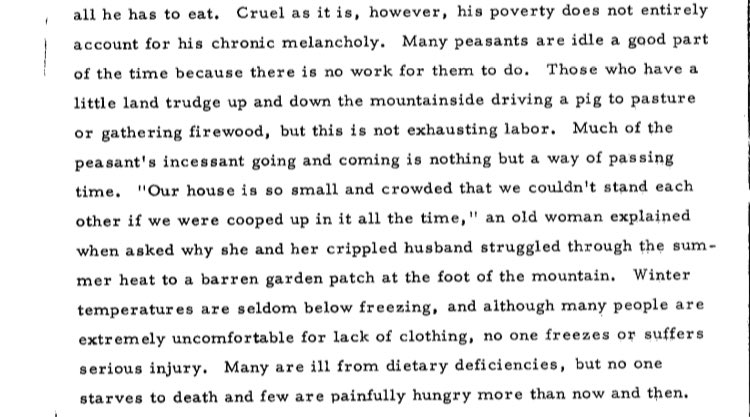
Last year I did a thread on Edward Banfield’s “Moral Basis of a Backward Society”, the seminal ethnography of a low-trust community.
Today I revisit Banfield to look at an aspect of “amoral familism” I’d previously passed over but now see as very important: doing nothing.
Today I revisit Banfield to look at an aspect of “amoral familism” I’d previously passed over but now see as very important: doing nothing.
One thing Banfield notes early on in “Moral Basis” is that although poverty is a natural explanation for the suspicious, asocial attitude typical of the Montegranese. Even the peasants themselves employ it. But it is, in fact, a poor excuse. 



Banfield contrasts the poverty stricken and ignorant Montegranese with early American settlers, who were just as ignorant and impecunious and whose situation was in many cases worse than those endured in Montegrano. 

And in the same breath dispels any notions that we can blame the total lack of civic participation witnessed in Montegrano on these concerns: the peasants hate their land, are not especially hostile to the state or other classes, and are not especially fatalistic. 





As noted above, the Montegranese are also not particularly hard done by in terms of having to work hard. Nobody engages in backbreaking labour in Montegrano; they are idle for a large portion of the time, even if they are too poor to employ their idleness as they would like. 



Some of you will likely be asking” “but what do the Montegtanese do with their time, if they aren’t working?”
The answer is likely to be deeply unsatisfying to the type of person who would ask the question: what they do is not very much at all.
The answer is likely to be deeply unsatisfying to the type of person who would ask the question: what they do is not very much at all.
Banfield doesn’t put a name to this most important of non-social non-economic non-activities.
I’d have been forced to coin one myself if my respected mutuals @GreatValueArhat and @kunley_drukpa hadn’t stepped in.
This phenomenon shall henceforth be known as “milling around.”
I’d have been forced to coin one myself if my respected mutuals @GreatValueArhat and @kunley_drukpa hadn’t stepped in.
This phenomenon shall henceforth be known as “milling around.”
“Milling around” or “milling” for short is the activity one engages in when one engages in no activity at all.
It is separate from simply “relaxing” or “doing nothing of productive value” or “down time”, or even from “wasting time” in the active sense. It is a state of almost heedless mere existence, what one does when doing anything is beyond the scope of possibility or comprehension.
If you’ve ever visited a developing country – or even some more neglected parts of developed countries – you’ve likely seen people sort of just standing around. Or sitting around. Not really doing anything at all, not waiting for anything, just staring into space.
If you’ve ever seen videos set in the deepest African bush you’ll likely have noticed at least a few people hanging out in the background, with no readily apparent reason for their presence. These people are also Milling Around.
Milling Around is the default activity for the bull of humankind because the bulk of humankind is ruthlessly materialistic. They will not engage in any activities superfluous to the acquisition of the calorie input they require to not starve to death.
If one’s some aspiration in life is to remain alive, then one needn’t do much to achieve it. When this has been accomplished, or is yet to be accomplished but cannot presently be accomplished, one Mills.
It is for this reason that transport interchanges are a preferred site for Milling Around. They are prime sites where someone might offer you an opportunity to acquire calories, or money that can buy some. And if that doesn’t happen? Mill Around a bit.
The tendency towards Milling Around in west is most fully expressed in underclass neighbourhoods in urban centres and in smaller rural communities. A huge amount of time in “village life” so called is devoted to it.
What one “has” to do to ensure mere survival is very limited in these environments and largely tied to small bursts of activity punctuated by long periods of not very much. For those unencumbered by higher aspiration, the obvious resultant behaviour is Milling Around.
It’s likely that many of you reading this struggle to understand the mindset of a person who is motivated by no more and no less than simply perpetuating their existence for another day. But it is, alas, the default. For many, it is only barely sublimated into higher drives.
Milling Around isn’t just confined to idleness, it encompasses the other pointless minutiae of living in The Community: endless petty scheming and vendettas, the preoccupation with the trivial, and the pursuit of nothing more than the means to procure another day’s Milling.
The reason that modern life is so dissatisfying to many is that it imposes a kind of enforced regimen of Milling Around, even in activity which should be anything but.
In a perverse way, our current way of life is in effect a return to a primitive state still common the world over. To live in the pod and eat the bugs is not much different than to live in the one room hovel and eat whatever detritus your digestive system can manage.
And in both cases, there is ample opportunity for Milling Around.
• • •
Missing some Tweet in this thread? You can try to
force a refresh








